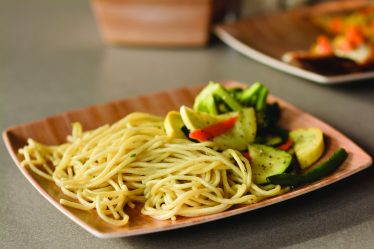
By Hailey Murphy
The Food Systems Working Group made its first dining hall product shift in February, taking a step towards Western’s goal of 25 percent “real food” in the dining halls by 2020.
“Real food is food that’s local, fair, humane or ecologically sound,” said Emmaline Bigongiari, student co-chair of the Food Systems Working Group.
The following five changes were made: crushed and diced tomatoes are now organic; the bread is organic and vegan; the flour is from a local brand, The Shepherd’s Grain; and the chicken breast is organic.
Bigongiari said these changes increase Western’s real food percentage by 5.42 percent, with the organic chicken breast contributing to a 4.24 percent increase.
Western administration committed to the Real Food Challenge in 2016. The goal, according to their website, is to shift $1 billion in university food budgets towards real food by 2020. Institutions across the nation have taken the challenge on, setting personal goals for their dining systems.
“While this goal of one-fourths real food may seem insignificant, it is actually a huge step in our corporate food system and really exciting. It is often difficult to find food that meets these standards on such a large scale,” Risa Askerooth, a sophomore on the Food Systems Working Group, said.
It’s the job of the Food Systems Working Group to achieve the goal. For the first product shift, said Askerooth, they’re focusing on “low-hanging fruits,” which are the least controversial and most cost effective changes.
Steven Wadsworth, Director of Dining Services, and Steve Erbe, Executive Chief Chef, researched possible product switches.
“The process involves [Wadsworth and Erbe] first doing research on food velocity reports and identifying possible switches that would both meet student needs and make sense financially,” Askerooth said.
The findings were then presented to the Product Shifting group, composed of two students– Maddy Jones, Office of Sustainability representative, and Askerooth– before being brought to the whole of the Food Systems Working Group. The committee then voted on the first round of changes.
More shifts are soon to come. Bigongiari said the committee is working with the Bagelry, which sources Zoe’s, to make minor adjustments to become real food friendly.
“It’s a possibility to work with folks that we’re already buying from,” said Bigongiari. “We don’t have to do an entire new sourcing and instead we can just encourage local producers to improve their standards.”
It’s hoped by both Bigongiari and Askerooth that future product shifts will take issues of food injustice into consideration, as using local and organic foods isn’t the only way to increase real food percentage points. Taking labor rights into consideration, decreasing meat products and serving culturally appropriate foods can also help Western reach its goal.
“We have products in our dining halls like coffee or bananas or chocolate– those industries tend to have bigger issues related to farm worker justice problems,” Bigongiari said. “So I’m hoping that, as the Food Systems Working Group continues, we can get into those tougher conversations.”
They also hope to increase student involvement, particularly with students who live on campus and use the dining halls most. Student voices can help inform which changes should be made next. The working group’s monthly meetings are open to public, so Bigongiari encourages students to come and voice their opinions. Students can learn when and where the next meeting is by following Students for Sustainable Food on Facebook.

